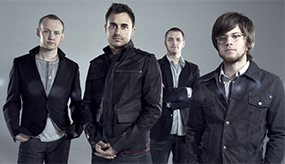
| Band Members | ||
| Joe King | – | rhythm guitar, backing vocals |
| Isaac Slade | – | lead vocals, piano |
| Dave Welsh | – | lead guitar |
| Ben Wysocki | – | drums |
The group’s second self-titled album, released in 2009, debuted at number-one on the Billboard charts and was certified gold in the United States, Australia and Canada. It was also nominated for a Grammy Award for Best Pop Vocal Album in 2010. While both the albums were commercially successful, critical reception was mixed. The Fray was ranked No. 84 on Billboard’s “Artists of the Decade” list. Their third album Scars & Stories, released in 2012, received moderate commercial success; debuting and peaking at number four on the Billboard 200. The album again received mixed reviews from critics.
The Fray’s use of the piano as the lead instrument in their music has led critics to compare the band with English piano-driven bands like Coldplay and Keane. However, the band lists its influences as The Wallflowers, Counting Crows, Better Than Ezra and U2.
Formation and Early Years
The band members’ lives were largely formed in Denver churches where they helped lead worship, and in the Christian school three of them attended. Slade, 24, and guitarist Joe King, 25, were several years ahead of drummer Ben Wysocki, 21, at Faith Christian Academy. Wysocki and guitarist David Welsh, 27, played in the same worship band. In the spring of 2002, former schoolmates Isaac Slade and Joe King reconnected and began regular two-man jam sessions that led to writing songs. Isaac and Joe later added Zach Johnson on drums and Slade’s younger brother Caleb on bass, though Caleb was later asked to leave. Caleb’s departure from the band caused a rift in his relationship with Isaac and this rift later became the inspiration for the song “Over My Head (Cable Car)”, which is about the brothers’ wanting relationship. Following this Johnson left the band as well to attend an art school in New York.
Ben Wysocki, a former bandmate of Isaac Slade, joined as drummer and later, Dave Welsh, who was another former band mate of Slade and Wysocki, was added as lead guitarist to the band. The newly formed band was named “The Fray”. The band members decided on a name after asking people to put band names on a piece of paper. They ended up picking “The Fray” randomly. The members of the band first claimed that they found the name suitable because they frequently quarreled about the composition of the lyrics in their songs, but they have since stated they are usually on good terms while composing music and acknowledges contributions from all of its members. The band has had no permanent bassist since Caleb, instead employing touring bassists on a temporary basis. The current bassist is Jeremy McCoy, who has been with the band since 2009.
The band released its first record, Movement EP in 2002. The next year, the band released Reason EP produced by How To Save A Life co-producer Aaron Johnson, which garnered the band local fame and acclaim. Westword, an alternative newsweekly, gave Reason EP a positive review, stating “The music is epic, no doubt, but it’s played on a wholly human scale”. Despite these reviews, the band struggled to launch a single; Denver radio station KTCL rejected eight of their songs before the band decided to submit a demo of “Cable Car”. The song found airplay on a KTCL radio show highlighting local bands, and the radio station received a large number of requests for it soon thereafter. The band changed the name of the song to “Over My Head (Cable Car)”, and as the song’s airplay increased alongside their local following, the band was voted “Best New Band” by Westword in 2004. Epic Records A&R man Daniel Davis discovered the band through the article in Westword and soon after, Epic Records officially signed the band on December 17, 2004.
Musical Style and Songwriting
How to Save a Life consisted of a mix of mid-tempo piano-driven pop rock tracks and power ballads. The band’s second album spread the spectrum of the music: the pop rock songs were faster and more energetic, while the ballads were softer than the ballads on the first album.
Lead vocalist and pianist Isaac Slade’s vocals feature falsetto and a strong American accent. His vocal style on the debut album was marked by a simple and emotive style. On the second album, his vocals, while retaining the basic style on the debut album, were stronger, edgier and more aggressive, most notably on the tracks “We Build Then We Break” and “Say When”.
The lyrics on both albums revolve around life’s problems and issues. Common themes include happiness, sadness, death, the problem of evil, relationships, and war. The honest and emotional nature of the lyrics has also had critics labeling The Fray as emo, comparing them to mainstream emo acts like Jimmy Eat World. The Fray’s initial songs contained lyrics with strong religious messages. However, by the time they began work on their debut album, the band decided against being an entirely religious outfit because they believe that God has called them away from the “Christian music genre and into a secular market.”
